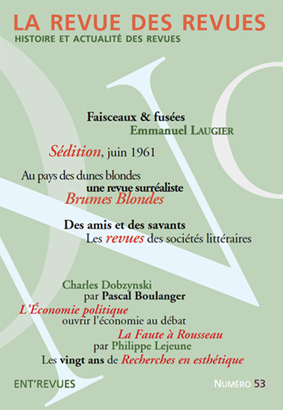par Richard Walter
2015, in La Revue des revues no 53
 Une revue surréaliste au pays des dunes blondes
Une revue surréaliste au pays des dunes blondes
L’aventure en quatre séries et quelques spin-off de Brumes Blondes
Issue du surréalisme néerlandais peu connu, Brumes Blondes animée par Her de Vries et Laurens Vancrevel a connu 32 numéros déclinés en 4 séries sur une période de plus de 46 ans : 1960-2007. Toujours richement illustrée, sobrement éditée, la revue n’a cessé de changer – format, typographie, logo – au gré des possibilités du moment, des aléas de la vie de ses créateurs, des temps de son apparition, mais elle est toujours restée fidèle à une grande ouverture au monde (surréalistes tchèques, espagnols, portugais…) publiant dans de nombreuses langues, plus qu’en néerlandais d’ailleurs. Fidèle aussi aux constantes des publications surréalistes en se voulant l’aiguillon d’autres activités (expositions, livres, activité collective) et par son mélange de poésie et de propos esthétiques ou philosophiques. Elle sut plus que d’autres se défier de tout sectarisme.
A Surrealist Review in the Land of Blond Dunes
The Adventure in Four Series and a Few Spin-Offs of [Blond Mists]
Proceeding from the little-known Deutch Surrealism, Brumes blondes [Blond Mists] animated by Her de Vries and Laurens Vancrevel was published in the form of 32 issues reparted in 4 series over a span of more than 46 years, from 1960 to 2007. Always lavishly illustrated and edited with sobriety, the review was constantly changing in format, typography, logotype, according to the possibilities of the time, the hazards in the life of its creators, the times when it was published, but it always remained faithful to a wide opening onto the whole world (Czech, Spanish, Portuguese surrealists…), publishing in many languages, foreign more than Deutch. It also remained faithful to the constants of surrealist publications whilst intending to promote other activities (exhibitions, books, collective work) and to its special blend of poetry and aesthetical or philosophical discourse. More than others, it cultivated the ability to avoid all kinds of sectarianism.